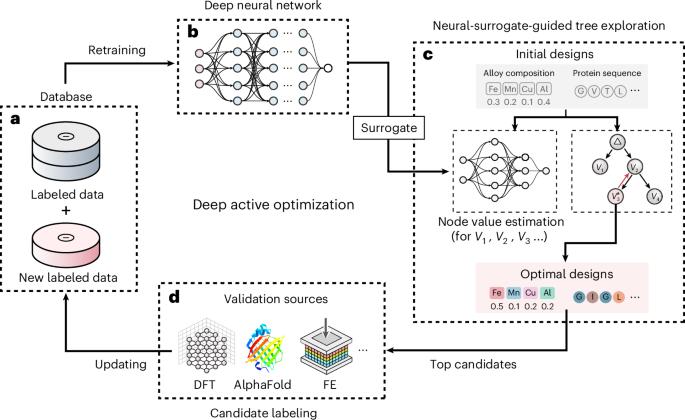Deep active optimization for complex systems
IF 18.3
Q1 COMPUTER SCIENCE, INTERDISCIPLINARY APPLICATIONS
引用次数: 0
Abstract
Inferring optimal solutions from limited data is considered the ultimate goal in scientific discovery. Artificial intelligence offers a promising avenue to greatly accelerate this process. Existing methods often depend on large datasets, strong assumptions about objective functions, and classic machine learning techniques, restricting their effectiveness to low-dimensional or data-rich problems. Here we introduce an optimization pipeline that can effectively tackle complex, high-dimensional problems with limited data. This approach utilizes a deep neural surrogate to iteratively find optimal solutions and introduces additional mechanisms to avoid local optima, thereby minimizing the required samples. Our method finds superior solutions in problems with up to 2,000 dimensions, whereas existing approaches are confined to 100 dimensions and need considerably more data. It excels across varied real-world systems, outperforming current algorithms and enabling efficient knowledge discovery. Although focused on scientific problems, its benefits extend to numerous quantitative fields, paving the way for advanced self-driving laboratories. This study introduces a deep active optimization pipeline that effectively tackles high-dimensional, complex problems with limited data. The approach minimizes sample size and surpasses existing methods, achieving optimal solutions in up to 2,000 dimensions.

复杂系统的深度主动优化。
从有限的数据中推断出最优解被认为是科学发现的终极目标。人工智能为大大加快这一进程提供了一条有希望的途径。现有的方法通常依赖于大型数据集、对目标函数的强假设和经典的机器学习技术,限制了它们在低维或数据丰富的问题上的有效性。在这里,我们介绍一个优化管道,可以有效地解决复杂的,高维的问题与有限的数据。该方法利用深度神经代理来迭代地找到最优解,并引入额外的机制来避免局部最优,从而最小化所需的样本。我们的方法在多达2000个维度的问题中找到了更好的解决方案,而现有的方法仅限于100个维度,需要更多的数据。它在不同的现实世界系统中表现出色,优于当前的算法,并实现有效的知识发现。虽然专注于科学问题,但它的好处延伸到许多定量领域,为先进的自动驾驶实验室铺平了道路。
本文章由计算机程序翻译,如有差异,请以英文原文为准。
求助全文
约1分钟内获得全文
求助全文

 求助内容:
求助内容: 应助结果提醒方式:
应助结果提醒方式:


